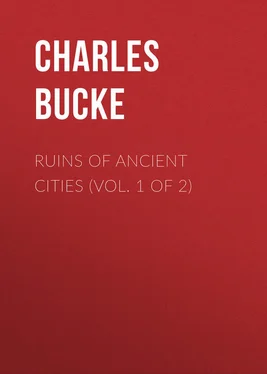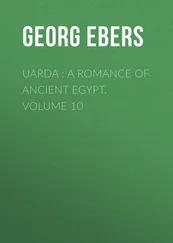Charles Bucke - Ruins of Ancient Cities (Vol. 1 of 2)
Здесь есть возможность читать онлайн «Charles Bucke - Ruins of Ancient Cities (Vol. 1 of 2)» — ознакомительный отрывок электронной книги совершенно бесплатно, а после прочтения отрывка купить полную версию. В некоторых случаях можно слушать аудио, скачать через торрент в формате fb2 и присутствует краткое содержание. Жанр: foreign_antique, foreign_prose, на английском языке. Описание произведения, (предисловие) а так же отзывы посетителей доступны на портале библиотеки ЛибКат.
- Название:Ruins of Ancient Cities (Vol. 1 of 2)
- Автор:
- Жанр:
- Год:неизвестен
- ISBN:нет данных
- Рейтинг книги:4 / 5. Голосов: 1
-
Избранное:Добавить в избранное
- Отзывы:
-
Ваша оценка:
- 80
- 1
- 2
- 3
- 4
- 5
Ruins of Ancient Cities (Vol. 1 of 2): краткое содержание, описание и аннотация
Предлагаем к чтению аннотацию, описание, краткое содержание или предисловие (зависит от того, что написал сам автор книги «Ruins of Ancient Cities (Vol. 1 of 2)»). Если вы не нашли необходимую информацию о книге — напишите в комментариях, мы постараемся отыскать её.
Ruins of Ancient Cities (Vol. 1 of 2) — читать онлайн ознакомительный отрывок
Ниже представлен текст книги, разбитый по страницам. Система сохранения места последней прочитанной страницы, позволяет с удобством читать онлайн бесплатно книгу «Ruins of Ancient Cities (Vol. 1 of 2)», без необходимости каждый раз заново искать на чём Вы остановились. Поставьте закладку, и сможете в любой момент перейти на страницу, на которой закончили чтение.
Интервал:
Закладка:
From these observations, it would appear that the spoliation of the Parthenon may be vindicated on the ground, that neither the Turks nor the citizens cared any thing about them, and that if they had not been taken away, they would, in a short time, have been destroyed. Respectable testimony, however, is opposed to this: most travellers have inveighed against the spoliation; and two, highly qualified, have given a very different account from what the above statement implies. These are Dr. Clarke and Mr. Dodwell. We shall select the testimony of the latter in preference to that of Dr. Clarke, only because he was at Athens at the very time in which the spoliation was going on. "During my first tour to Greece," says he, "I had the inexpressible mortification of being present when the Parthenon was despoiled of its finest sculpture, and when some of its architectural members were thrown to the ground." * * * "It is, indeed, impossible to suppress the feelings of regret which must arise in the breast of every traveller, who has seen these temples before and since their late dilapidation! Nor have I any hesitation in declaring, that the Athenians in general, nay, even the Turks themselves, did lament the ruin that was committed; and loudly and openly blamed their sovereign for the permission he had granted! I was on the spot at the time, and had an opportunity of observing, and, indeed, of participating, in the sentiment of indignation, which such conduct universally inspired. The whole proceeding was so unpopular in Athens, that it was necessary to pay the labourers more than their usual profits, before any one could be prevailed upon to assist in this work of profanation."
Конец ознакомительного фрагмента.
Текст предоставлен ООО «ЛитРес».
Прочитайте эту книгу целиком, купив полную легальную версию на ЛитРес.
Безопасно оплатить книгу можно банковской картой Visa, MasterCard, Maestro, со счета мобильного телефона, с платежного терминала, в салоне МТС или Связной, через PayPal, WebMoney, Яндекс.Деньги, QIWI Кошелек, бонусными картами или другим удобным Вам способом.
1
Plutarch; Diodorus; Rollin; Sandwich.
2
Pliny; Strabo; Plutarch; Diodorus; Wilkinson.
3
Simon; Count Fedor de Karacray; Malte-Brun.
4
"Ægina abounds," says Wheler, "with a sort of red-legged partridge, against which, by order of the Epitropi, or the chief magistrate of the town, all, both young and old, go out yearly, as the pigmies of old did against the cranes, to war with, and to break their eggs before they are hatched; otherwise, by their multitudes, they would so destroy and eat up the corn, that they would inevitably bring a famine every year upon the place."
5
Mr. C. R. Cockerell and Mr. John Foster; W. Linckh and Baron Haller.
6
Wheler; Chandler; Barthélemi; Sandwich; Lusieri; Clarke; Dodwell; Williams; Leake.
7
Rollin.
8
Livy, Cicero, Diodorus Siculus, Rollin, Brydone; Encyl. Lond., Brewster's Encyl.
9
Dionysius of Halicarnassus; – Sir W. Gell.
10
Jose Almana.
11
Browne.
12
Myos Hormos.
13
Four hundred and fifty talents of gold. See 2 Chron. viii. 18. This, we may suppose, was the gross sum received; not the profit.
14
A. M. 3685. Ant. J. C. 321. Diod. lib. xviii. p. 608, 610.
15
This author lived in the fifteenth century.
16
Earl of Sandwich.
17
Some have commended Ptolemy for permitting the architect to put his name in the inscription which was fixed on the tower, instead of his own. It was very short and plain, according to the manner of the ancients. Sostratus Cnidius Dexiphanis F. Diis Servatoribus pro navigantibus , i. e. , "Sostratus the Cnidian, son of Dexiphanes, to the protecting deities, for the use of sea-faring people." But certainly Ptolemy must have very much undervalued that kind of immortality which princes are generally very fond of, to suffer that his name should not be so much as mentioned in the inscription of an edifice so capable of immortalising him. What we read in Lucian, concerning this matter, deprives Ptolemy of a modesty, which indeed would be very ill-placed here. This author informs us that Sostratus, seeing the king determined to engross the whole glory of that noble structure to himself, caused the inscription with his own name to be carved in the marble, which he afterwards covered with lime, and thereon put the king's name. The lime soon mouldered away: and by that means, instead of procuring the king the honour with which he had flattered himself, served only to discover to future ages his unjust and ridiculous vanity. – Rollin.
18
Savary.
19
Lib. xxii. c. 16.
20
See his observations on the supposed conflagration of the Alexandrian library, with a commentary on the 5th and 6th sections of the first chapter of the tenth book of Quintilian.
21
Rees.
22
Browne.
23
A very curious instance is afforded by Bruce, who wrote an account of Alexandria, and, literally, did not spend one entire day in the city. He was at sea on the morning of the 20th of June, 1768, previously to his landing in Alexandria, (see Bruce's Travels, v. i. p. 7,) and in the afternoon he left that city for Rosetta. – Clarke.
24
Browne.
25
After the English were in possession of Alexandria, a subscription was opened by the military and naval officers for the purpose of removing the prostrate obelisk to England. With the money so raised they purchased one of the vessels, sunk by the French in the old port of Alexandria: this was raised, and prepared for the reception of the obelisk. The French had already cleared away the heaps of rubbish which enveloped it, and the English turned it round, and found it in a fine state of preservation. It was moved towards the vessel, when an order arrived from the Admiralty, prohibiting the sailors from being employed at this work. No further attempts have been made to remove this fine monument to Europe. – Anon.
26
Wilkinson.
27
Sonnini.
28
He gives a full description of them. – Part iv. p. 285, 4to.
29
Sat. Mag.
30
Diodorus Siculus; Quintilian; Ammianus Marcellinus; Abulfaragius; Prideaux; Rollin; Shaw; Harris; Gibbon; Johnson; Drake; Savary; Sonnini; Sandwich; Rees; Miot; Clarke; Wilkinson; Browne; Parker; Knight.
31
Rollin; Sandwich.
32
A. M. 3604, A. C. 300.
33
Wheler; Pococke; Chandler; Rees; Sandwich; Porter; Kinneir; Buckingham; Carne; Robinson; Walpole.
Читать дальшеИнтервал:
Закладка:
Похожие книги на «Ruins of Ancient Cities (Vol. 1 of 2)»
Представляем Вашему вниманию похожие книги на «Ruins of Ancient Cities (Vol. 1 of 2)» списком для выбора. Мы отобрали схожую по названию и смыслу литературу в надежде предоставить читателям больше вариантов отыскать новые, интересные, ещё непрочитанные произведения.
Обсуждение, отзывы о книге «Ruins of Ancient Cities (Vol. 1 of 2)» и просто собственные мнения читателей. Оставьте ваши комментарии, напишите, что Вы думаете о произведении, его смысле или главных героях. Укажите что конкретно понравилось, а что нет, и почему Вы так считаете.












